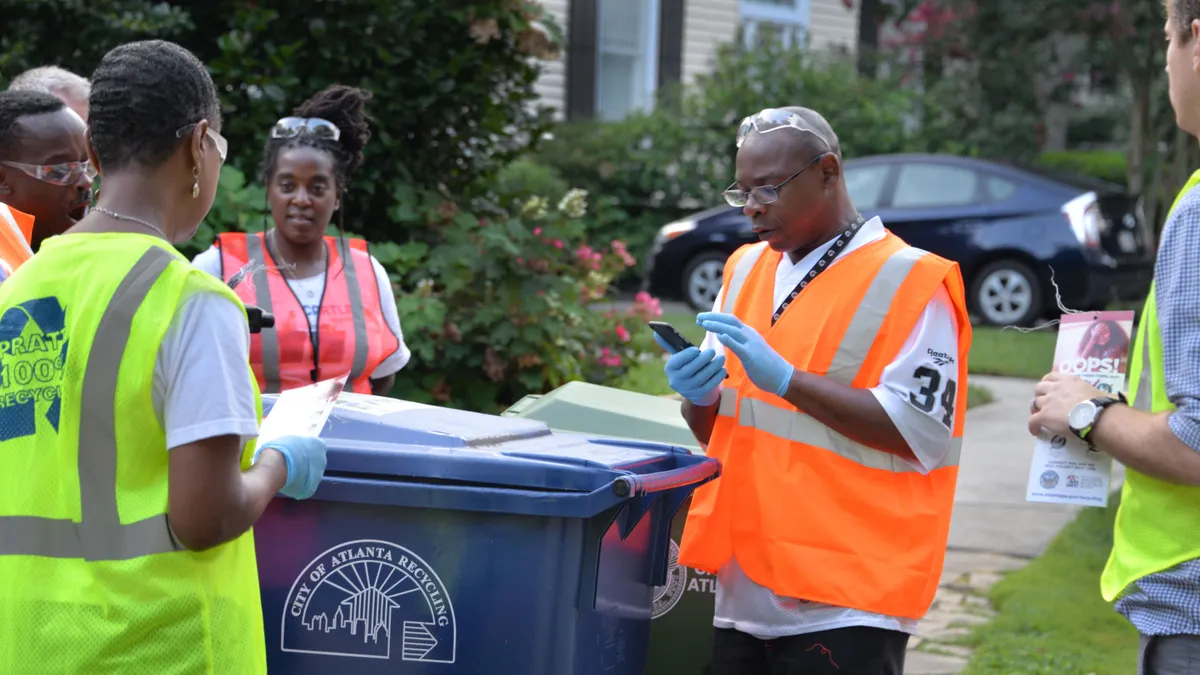Dive Brief:
- The Recycling Partnership has launched its latest contamination reduction pilot in Atlanta with a new "Feet on the Street" campaign along four recycling routes. The eight-week program is sponsored by a grant from the national nonprofit worth an estimated $240,000.
- Training began this week for city employees who will be inspecting residential recycling carts, noting the amount and type of contamination, and tagging any problem carts with "oops" tags, including information on what to fix. Plastic bags are the city's top priority, along with food, liquids, electronics and other items that are unwelcome at the local material recovery facility operated by Pratt Industries. All of this data will be recorded using Rubicon Global's app as part of a separate and ongoing technology pilot with the city.
- Cascadia Consulting Group will also be providing a new level of data analysis with detailed before-and-after waste characterization studies to track the pilot's effectiveness. Based on these results, Atlanta then plans to roll out a citywide campaign about contamination and participation in 2018.
Dive Insight:
The Recycling Partnership first began experimenting with this concept of cart inspections and targeted education in Massachusetts last year and those lessons have since expanded to multiple other municipalities. Chicago is the latest and another major city announcement is expected soon. Jason Hale, vice president of communications for The Recycling Partnership, told Waste Dive that their new partnership with Cascadia will provide a whole new level of data in both Atlanta and Chicago. This will provide a detailed understanding of behavior changes on a household level, as well as a more updated waste characterization understanding.
“It's an extremely surgical glance into what’s going on and how our tactics are affecting behavior," said Hale.
The fact that Rubicon's app is already being tested in Atlanta's collection fleet has made the weekly tracking process much faster as well. While Hale said other cities had various forms of electronic logging systems, "none of them are nearly as refined" as what Rubicon customized for this project. City employees can use the app to check off each of the six target contaminants at a household level and then download that data to get a daily picture of residents' progress around the city.
“We had high contamination rates and in some parts of the city low participation rates. So we wanted to do a targeted focus on driving down contamination and increasing participation," said Kanika Greenlee, environmental programs director for Atlanta's Department of Public Works, referring to what she characterized as "high" contamination rates. “Success to me looks like driving that down hopefully by double digits."
Hale emphasized that even though this approach has begun to follow a pattern in multiple cities it's still considered a pilot for a reason, because the needs of each city are different. Though plastic bags have become a common theme in many of the cities they've worked in so far, the new levels of data will likely provide an even more nuanced picture.
As The Recycling Partnership continues to add new cities to its roster of more than 250 communities that have received some form of assistance there are many more in need of behavioral help. Toronto, Toledo, KS, Providence, RI and Austin have all been testing out their own approaches to the single-stream sorting challenge in recent months.















